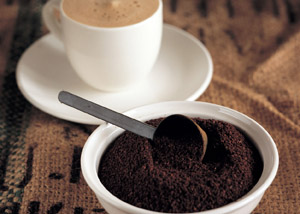Introduction of Ugandan coffee bean flavor manor with unique papaya flavor
The coffee growing industry in Uganda is one of the pillar industries of its exports. Uganda is the birthplace of Robsta in Africa, just as Ethiopia is the origin of Arabica coffee, while Robster coffee was first discovered in Uganda. So far, Uganda has a history of growing coffee for more than 100 years. The output ranks second in Africa, after Ethiopia. At the same time, Uganda is one of the few major countries in Africa dedicated to the production of organic coffee. In Uganda (Uganda), Arabica coffee beans account for only 15% of the country's total coffee production, and Uganda's best coffee is mainly produced in the mountains of Elgon and Bugisu along the Kenyan border in the north-east and Ruwensori in the west.
The cultivation of coffee in Uganda is all small-scale family operation. The livelihood of 25% of the population is closely related to coffee production. About 500000 farms grow coffee, but mainly Robster. Robster accounts for 90% of coffee production, and the remaining 1 is Arabica coffee. Arabica and Live Buster are harvested from October to February of the following year. The main sales areas and quality grades of Ugandan coffee are: Bujisu Bugisu AA (accounting for only 4% of the total national production), Bujisu Bugisu A, Vago Wugar A (all of the above belong to water washing treatment), and a small amount of sun-dried bean beads Drugar. Bugisu Bugisu AA. Among them, AA represents the grade of coffee and represents the highest grade in the country. Bugisu Bugisu grows on the slopes of Mount Elgon in eastern Uganda. The palate is thick and low in acidity, with a unique taste of raw papaya, which is very different from other East African coffee, closer to Java coffee in Indonesia.
Uganda leads Africa in coffee production, accounting for more than 70% of its total exports. In the 1960s, Ugandan coffee production remained at 3.5 million bags a year. By the mid-1980s, coffee production had dropped to 2.5 million bags a year, mainly for political reasons. But now coffee production is on the rise again, currently about 3 million bags a year. It is mainly exported to the European Union, with Germany, Italy and other countries as the largest coffee buyers.
Ugandan Coffee settled in Beijing
Xinhua News Agency, Beijing, 3 Apr (Reporter Wang Jun)-- Beijing Chenao Coffee Co., Ltd., a cooperation project between China and Uganda, officially opened in Beijing today. James Wapakhabulo, deputy prime minister of the Republic of Uganda, his wife Angelina Wapakhabulo, and Meng Xuenong, executive vice mayor of Beijing, attended the opening ceremony.
Beijing Chenao Coffee Co., Ltd. is a joint venture between Beijing Beichen Industrial Group and Uganda Coffee Development Bureau. It is the first coffee enterprise in Uganda to cooperate with China.
Uganda is a tropical African country, its fertile soil, suitable altitude and climatic conditions are suitable for the growth of high-quality coffee. As early as more than a decade ago, the leaders of China and Ukraine had the intention to enhance the trade cooperation and traditional friendship between the two countries through coffee trade. With the concern of the leaders of the two countries and the support of the Beijing Municipal Government, Beijing Beichen Industrial Group and the Ugandan Coffee Development Bureau formally signed a cooperation agreement on January 21 this year. The coffee launched by Chenao Company chooses the pattern of Crown Crane, a rare bird well known in Uganda, as a trademark to represent the natural and pure coffee products.

Important Notice :
前街咖啡 FrontStreet Coffee has moved to new addredd:
FrontStreet Coffee Address: 315,Donghua East Road,GuangZhou
Tel:020 38364473
- Prev

Introduction of noble, tender and elegant Cuban crystal coffee
Cubita is Cuban coffee, which is mainly exported to Japan, France, Germany, Ireland, Canada and other countries. The cubita coffee entering the Chinese market is all selected from the pollution-free Crystal Mountain coffee beans in the high altitude areas of Cuba, which is a typical Caribbean coffee bean. All the granules of coffee beans are strictly selected according to the standard of sieve 17-19, and the selected coffee beans have large particles and high maturity.
- Next

Boutique coffee Lake Titicaca in Bolivia small farmers in Pagabana have few coffee beans in America.
Boutique coffee (specialty coffee) is also called specialty coffee selection coffee. It refers to coffee made from a small number of raw beans with excellent taste grown in an ideal geographical environment. Depending on the special soil and climatic conditions in which they grow, they have outstanding flavor. After strict selection and classification, this kind of coffee is hard in texture, rich in taste and stylish.
Related
- Does Rose Summer choose Blue, Green or Red? Detailed explanation of Rose Summer Coffee plots and Classification in Panamanian Jade Manor
- What is the difference between the origin, producing area, processing plant, cooperative and manor of coffee beans?
- How fine does the espresso powder fit? how to grind the espresso?
- Sca coffee roasting degree color card coffee roasting degree 8 roasting color values what do you mean?
- The practice of lattes: how to make lattes at home
- Introduction to Indonesian Fine Coffee beans-- Java Coffee producing area of Indonesian Arabica Coffee
- How much will the flavor of light and medium roasted rose summer be expressed? What baking level is rose summer suitable for?
- Introduction to the characteristics of washing, sun-drying or wet-planing coffee commonly used in Mantenin, Indonesia
- Price characteristics of Arabica Coffee Bean Starbucks introduction to Manning Coffee Bean Taste producing area Variety Manor
- What is the authentic Yega flavor? What are the flavor characteristics of the really excellent Yejasuffi coffee beans?

